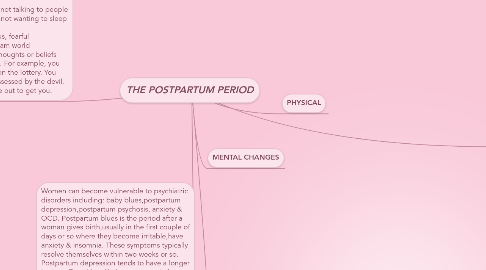
1. feeling ‘high’, ‘manic’ or ‘on top of the world’ low mood and tearfulness anxiety or irritability rapid changes in mood severe confusion being restless and agitated racing thoughts behaviour that is out of character being more talkative, active and sociable than usual being very withdrawn and not talking to people finding it hard to sleep, or not wanting to sleep losing your inhibitions feeling paranoid, suspicious, fearful feeling as if you’re in a dream world delusions: these are odd thoughts or beliefs that are unlikely to be true. For example, you might believe you have won the lottery. You may think your baby is possessed by the devil. You might think people are out to get you.
2. Women can become vulnerable to psychiatric disorders including: baby blues,postpartum depression,postpartum psychosis, anxiety & OCD. Postpartum blues is the period after a woman gives birth,usually in the first couple of days or so where they become irritable,have anxiety & insomnia. These symptoms typically resolve themselves within two weeks or so. Postpartum depression tends to have a longer lasting effect. Most likely occurrence is four months postpartum. Postpartum psychosis is sever mental illness after giving birth.
3. EMOTIONAL EFFECTS/SYMPTOMS
3.1. Severe depression can lead to emotional stress. Some women hurt their babies and themselves as a result of a mood disorder developed post partum. Some are not able to connect emotionally with their newborn as well as are afraid to be alone with their child. Many suicide murders have occurred as a result of post partum depression. Post partum depression can occur anytime during the first year after a women gives birth. There are a number of factors that pre determine whether a women will develop post partum depression.
3.1.1. History of depression or substance abuse Family history of mental illness Little support from family and friends Anxiety about the fetus Problems with previous pregnancy or birth Marital or financial problems Young age of motheri
3.1.2. SIGNS & SYMPTOMS INCLUDE:Feeling restless or irritable Feeling sad, hopeless, and overwhelmed Crying a lot Having no energy or motivation Eating too little or too much Sleeping too little or too much Trouble focusing, remembering, or making decisions Feeling worthless and guilty Loss of interest or pleasure in activities Withdrawal from friends and family Having headaches, chest pains, heart palpitations (the heart beating fast and feeling like it is skipping beats), or hyperventilation (fast and shallow breathing) After pregnancy, signs of depression may also include bei

